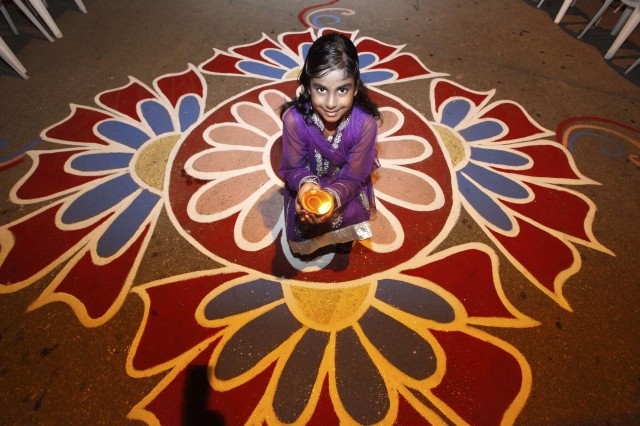Diwali 2012 Celebrations: Festival of Lights Captured on Camera
Diwali, the famous Indian Festival of Lights, ushered in, as is traditional, a fresh start in the lives of Hindus across the world and people everywhere observed the celebrations and rites with great fervour.
The festival marks the worship of the Indian Goddess Lakshmi (the deity of wealth and riches), asking for her blessings and a prosperous year ahead. It occurs on the fifteenth lunar day of the dark fortnight of the Hindu calendar month Ashwin and this year Diwali fell on 13 November.
Customs and Traditions
The Diwali festivities begin with a cleaning spree - the act of cleaning and beautifying one's home has a strong symbolic undercurrent - to please and welcome the Goddess Lakshmi. For this purpose then, all through a home, both inside and outside, people light earthen oil lamps and these are called diyas. The sight of a row of houses, all washed clean and adorned with rows upon rows of twinkling lamps, is a sight to behold, particularly at night time, and the reason why this is the Festival of Lights.
In addition, to the diyas, people also adorn idols of the Goddess with new clothes, floral garlands and other embellishments. Sweets, confectionaries and other culinary delicacies are also offered to the Goddess, as part of the ritual.
To return to the lighting of the lamps, this act forms the core of all Diwali traditions. The legends say the tradition dates back to the lifetime of Lord Ram, a central figure in Indian mythology and epics. The story goes that after 14 years of exile, the people of his kingdom (Ayodhya) lit oil lamps all across the city to welcome their king home... and it is that act of devotion, from a subject to his/her beloved king, that is re-created every year. Modernity has had its say though, and today candles are an acceptable substitute.
Also, like many other Indian festivals, the essence of Diwali has indulged that same modernity's creative streak. For instance, it is now customary to design a rangoli (colourful designs on the floor, laid with powdered colours) to add to the general splash of fun and frolic.
Dhanteras - A Golden Day
Diwali is also that time of the year when gold sales surge in the country. This is because of the tradition of Dhanteras - observed a day before Diwali - on the thirteenth lunar day of Ashwin. Dhanteras ("Dhan" means wealth and "teras" means 13) marks the start of the worship of Goddess Lakshmi and people generally buy gold jewellery, silver utensils and other precious metals to mark the occasion.
Diwali - A Social Festival
The essence of any festival is its social nature. These occasions are meant to bring communities closer together and Diwali is no different. In fact, the social nature of such a time shines through strongly in the celebration of Diwali. People exchange gifts, sweets and burst firecrackers together on Diwali.
Catch a glimpse of Diwali 2012 celebrations from around the world in pictures below. Here's wishing everyone a Happy Diwali!














© Copyright IBTimes 2024. All rights reserved.









